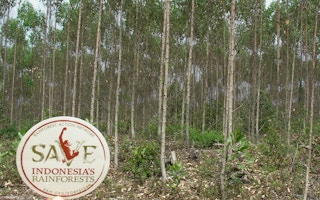An absence of labeling requirements on paper goods makes it difficult to track where Indonesia’s former forests emerge on the market.
Likewise, large conglomerates like APRIL and Asia Pulp & Paper (APP) have long used the lack of clear connections to small concessions, affiliates and subsidiaries to distance themselves from allegations of deforestation or other objectionable activities.
If a supplier is caught operating outside of its permitted boundaries, for example, the conglomerate might respond by stating it has no control over independent operators, and will cease doing business with the offender. This gambit is less convincing, however, if the small operator has a direct connection to that conglomerate — a connection that has often been difficult to prove.
Enter the Indonesian Forest Products Database (FPD), a project by the Environmental Paper Network. This catalogue of companies up and down the paper chain seeks to clarify exactly who is connected to the two major players in Indonesia’s paper industry: Royal Golden Eagle (RGE) and Sinar Mas. The business groups respectively own APRIL and APP, each of which presides over an empire of pulpwood plantation and mills in the archipelago.
Both of these groups have been under scrutiny in recent years for their legacies of deforestation and allegations of human rights violations. Under increased pressure by NGOs and the scientific community, both have recently made sweeping commitments to clean up their practices and achieve sustainability in their operations.
However, reports from various regional NGOs continue to find that some small companies with connections to these two giants are still operating in violation of these policies. The FPD provides a single resource for determining exactly which of these small companies are directly connected to RGE or Sinar Mas, and how.
Joshua Martin, director of the Environmental Paper Network, and project manager for the FPD, explains that the database was conceived as a tool for businesses engaged with the paper industry that wish to vet their sources.
Martin shared one potential-use case with Mongabay: “Company X has a no-deforestation policy or a special designation of high risk for sourcing from Indonesia, and they want to know if there is a link to APP or APRIL in their supply chain so they provide their purchasing staff a link to this list, with guidance, as part of implementation. They may be choosing to avoid these suppliers until they see proven results of their promises. Or they may want to apply conditions on their contracts that are tied to progress in implementing the promises.”
The connections listed in the database include suppliers, processors, distributors and natural resource companies that supply materials to, or sell products created by, Indonesia’s pulp and paper industry.
The links are gleaned from a variety of sources including company websites, stockholder and earnings reports, LinkedIn listings and government registration data. The connections are ranked based on the level of certainty, with the strongest links made available to the public.
“There are a broad range of sources for the connections and they have been researched by the Borealis Centre for Environment and Trade Research,” Martin said. “The ones viewable on this database are all the connections that we have a high level of certainty for.”
Since the parent-subsidiary link is often in flux as holdings are shuffled or handed over to offshore tax havens, the exact hierarchy can be difficult to track. Despite that caveat, however, Martin is confident in the connections.
“
The ones viewable on this database are all the connections that we have a high level of certainty for.
Joshua Martin, director of the Environmental Paper Network
Although the database may not know exactly where a company fits into the family tree, Martin said, “we do know whether or not each company is part of the Sinar Mas/APP or RGE/APRIL/Asia Symbol groups, [and] each company listed in the EPN website is part of those two groups.”
The Environmental Paper Network is a global network of over 100 organizations that support the Global Paper Vision for a clean, healthy, just and sustainable paper industry. The EPN’s steering group includes the Natural Resources Defense Council, Rainforest Action Network, Dogwood Alliance, Conservatree, Green America, Canopy, Global Green USA, ForestEthics and Climate for Ideas. They also have active participation from Greenpeace US and Canada and WWF, which participate in Working Groups and in monthly calls.
Funding for the FPD comes from The Climate and Land Use Alliance and the Blue Moon Fund. The maintainers intend to update the data quarterly.
RGE is owned by one of Indonesia’s richest men, Sukanto Tanoto, who is worth $1.33 billion according to Forbes. RGE’s holdings include pulp and paper giant Asia Pacific Resources International Holdings Limited (APRIL), palm oil giants Asian Agri and Apical Group Limited, and energy giant Pacific Oil and Gas.
Sinar Mas Group is owned by Eka Tjipta Widjaja (worth $5.3 billion) and his family. Holdings include palm oil conglomerates Golden Agri-Resources and PT Smart as well as APP.
This story was published with permission from Mongabay.










